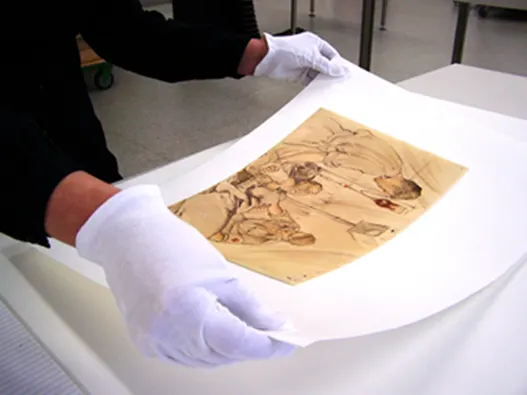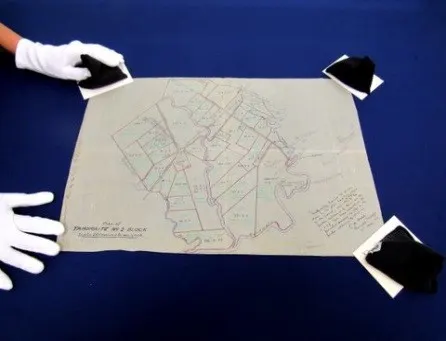Let’s work hand in glove
Conservator Anna Whitehead explains why it’s important to wear gloves if you’re handling sensitive archives, and when it’s acceptable to have clean, dry hands instead.
Our Reading Room guidelines sets out many dos and don’ts regarding the safe handling of our taonga tuku iho archives. One of those requirements is to wear gloves for certain types of archive.
When it’s important to wear gloves
Certain materials are very sensitive and therefore gloves are important. We recommend gloves for handling photographic material and albums, animal skins (such as leather or parchment documents and bindings), artworks, metals, textiles, CDs, AV materials and for any weird or wonderful object that may turn up. Yes, we have all these in the archives.
Extra care
Specific types of glove are recommended for ultra-sensitive materials, such as any photographic media and albums. If you’re handling these, vinyl, nitrile or latex gloves completely exclude any chance of perspiration getting through to the object.
When bare hands are enough
It can be more difficult to turn pages in a file of flimsy paper documents or the pages of a book while wearing gloves. As long as your hands are washed and dry, the risk of staining the paper is reduced.
Picture a scenario when you are handling a parchment-covered volume with gloves on, but you have difficulty turning the paper pages inside while wearing the gloves. You can do this without gloves, or you can keep the gloves on and turn the pages with the help of a strip of paper. This helps you lift the page at the corner, and you can use the paper strip to guide your eye to the line of text you are reading.
General dos and don’ts
Even while wearing gloves, don’t touch the writing ink while reading. Touching the ink can abrade it (wear it away), especially in the case of parchment documents, where the ink sits on the surface, unlike paper where it sinks in. Instead get a slip of paper to guide your eye along the text.
Don’t lean or rest on the archive. Instead, use weights to hold pages flat. Snake weights are good to hold the pages of a book open. Place weights on each corner of a map or plan to keep it flat, rather than using your hands.
Do wear gloves to protect yourself from dirt, leather dust, or if you encounter dried-on mould (report mould to the staff, so it can be checked and cleaned off). Recent and ongoing research in the USA also shows that some 19th century pigmented cloth book covers can contain heavy metals such as arsenic, so handling these bindings with nitrile gloves is also recommended.



